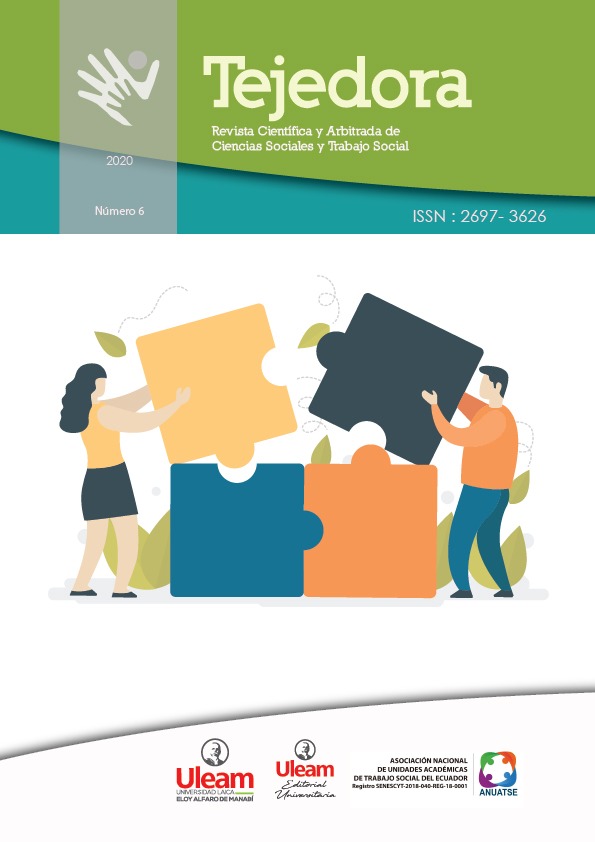Psychosocial repercussions due to covid-19 in adolescents
DOI:
https://doi.org/10.56124/tj.v6i12ep.0108Keywords:
Repercussions psychosocial, Adolescent, Causes, Pandemic, COVID-19Abstract
The present research work raised the topic "Psychosocial repercussions due to COVID-19 in adolescents, which is developed under qualitative and quantitative methodology, proposing alternatives of methods oriented to the adolescents through the survey of the aforementioned educational unit whose results will allow us as future social workers in the professional field to know the intervention that should be carried out in cases of psychosocial repercussions in adolescents due to COVID-19; analyzing the problem that attracted consequences by intervening through the survey and interview to promote change and well-being in them.
Giving this, the magazine was made known in order to give us their point of view on the psychosocial repercussions, they also gave us the surveys that try to describe a statistical profile of the population and the results, with the data collection it was sought to provide the due evidence in the present study. Once the surveys were carried out, the process of collecting information was announced, and the content analysis of the thematic axes proposed in the theoretical framework was carried out
Downloads
References
Belmont, G., & Velásquez, M. C. (2020). La intervención en lo social en tiempos de pandemia. Universidad Nacional Autónoma de México.
Cadena, P., Rendón, R., Jorege, A., Salinas, C., De la Cruz, F., & Sangerman, D. (2017). Métodos cuantitativos, métodos cualitativos o su combinación en la investigación: un acercamiento en las ciencias sociales. Revista Mexicana de Ciencias Agrícolas, 8(7), 1603-1617. doi:https://www.redalyc.org/articulo.oa?id=263153520009
Dávila, A. M. (2020). Actividades docentes online yu el desarrollo de la empatía en la fase de aislameinto de la pandemia Covid - 19. Universidad Técnica de Ambato.
Frances, S. (2021). El Covid - 19 y la salud mental: ¿Cuáles son las consecuencias? Revista Psicología Iberoamericana, 1-5. doi:https://www.redalyc.org/jatsRepo/1339/133963198003/index.html
Hernández, T. A., & Coello, S. (2020). El paradigma cuantitativo de la investigación científica. Editorial Universitaria. doi:https://books.google.com.ec/books?id=5d_zDwAAQBAJ&pg=PA94&dq=entre vista+y+encuesta&hl=es&sa=X&ved=2ahUKEwjh_9- BsK_1AhXLSTABHfo3BMgQ6wF6BAgJEAE#v=onepage&q=entrevista%20y%2 0encuesta&f=false
Martínez, J. (2020). Martínez, Jonathan. Salud Mental en estudiantes chilenos durante confinamiento por Covid-19: revisión bibliográfica., 10(2), 1-10. doi:https://doi.org/10.35811/rea.v10i2.126
Montés, G. (2000). Metodología y Técnicas de Diseño y realización de encuestas en el área rural. Temas Sociales(21), 39-50. doi:http://www.scielo.org.bo/pdf/rts/n21/n21a03.pdf
Valero Cedeño, N., Mina Ortiz, J., Veliz Castro, T., Merchán Villafuerte, K., & Perozo Mena, A. (2020). COVID-19: La nueva pandemia con muchas lesiones y nuevos retos. Revisión Narrativa, 48(1). doi:https://doi.org/10.5281/zenodo.3745322
Vargas, G., Quintero, A., & Sánchez, L. (2018). Los riesgos psicosociales como factores determinantes en el proyecto de vida de los estudiantes de la Universidad Abierte y a Distancia - UNAD (Colombia). Revista Espacios, 40(39), 1-8. doi:http://www.revistaespacios.com/a18v39n40/a18v39n40p08.pdf
Published
How to Cite
Issue
Section
License
Copyright (c) 2024 Revista Científica y Arbitrada de Ciencias Sociales y Trabajo Social: Tejedora. ISSN: 2697-3626

This work is licensed under a Creative Commons Attribution-NonCommercial-ShareAlike 4.0 International License.






















